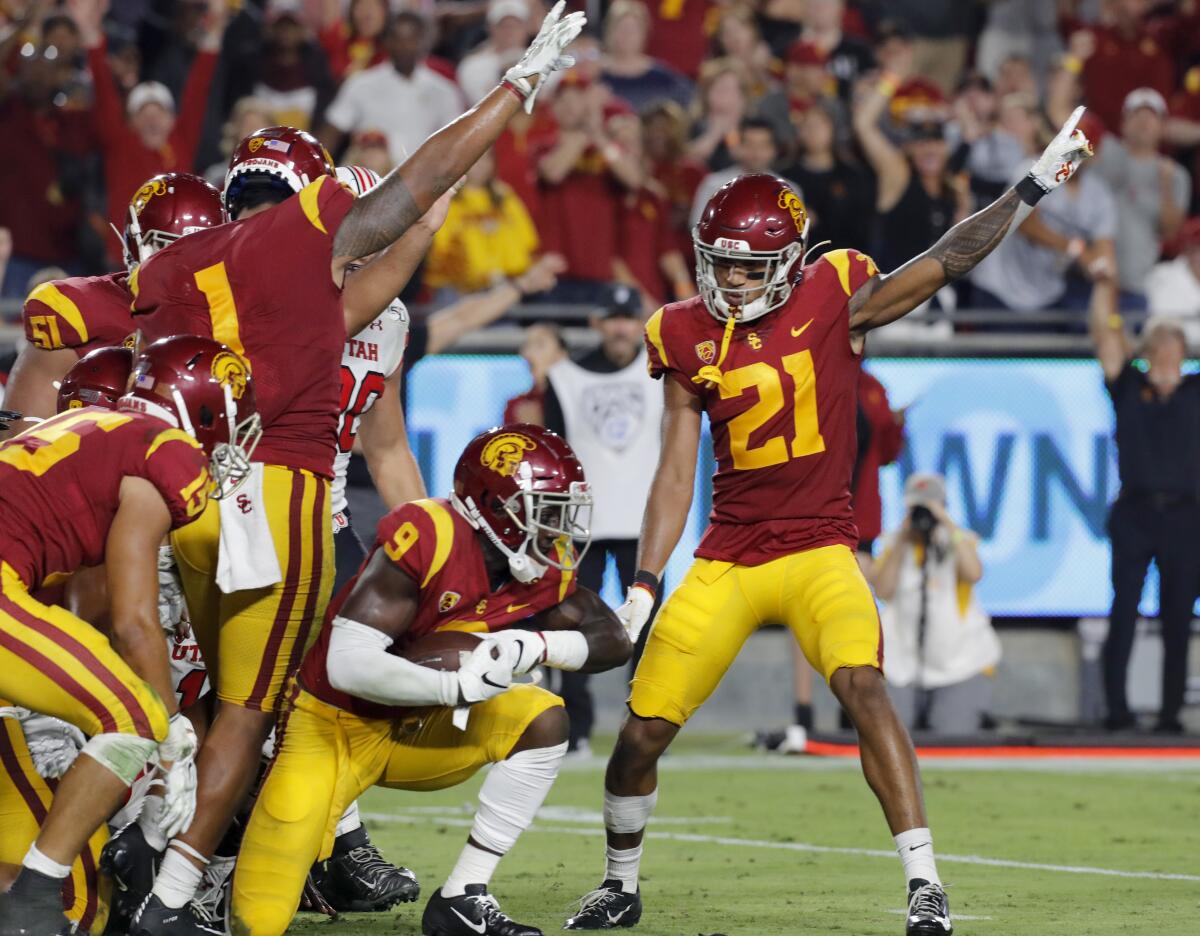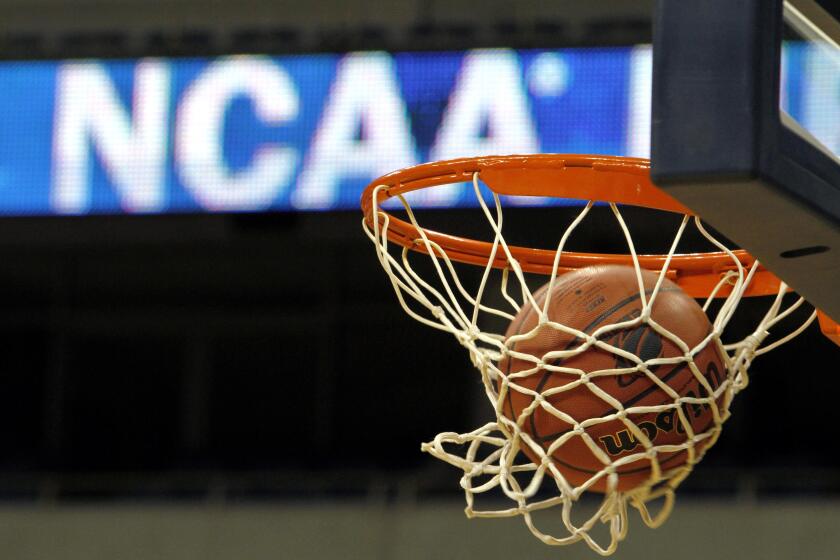California will allow college athletes to profit from endorsements under bill signed by Newsom

- Share via
SACRAMENTO — California became the first state to require major financial reforms in college athletics on Monday after Gov. Gavin Newsom signed into law a measure that allows players to receive endorsement deals, despite the National Collegiate Athletic Assn. calling the move unconstitutional.
Other states have proposed similar measures to pressure the NCAA, but so far only California is on a collision course with the governing body of college athletics, a billion-dollar organization that has repeatedly opposed efforts to allow players to profit off their sports.
Senate Bill 206 by Sen. Nancy Skinner (D-Berkeley) prohibits the NCAA from barring a university from competition if its athletes are compensated for the use of their name, image or likeness beginning Jan. 1, 2023. The University of California system, California State University schools, Stanford and USC all opposed the bill, saying they feared it would increase costs to ensure compliance with the law and lead to fines or even expulsion from the NCAA.
Newsom said university presidents and athletic boosters contacted him and urged him to veto the bill but that he felt strongly the state needed to address the racial, gender and economic injustices ingrained in college athletics.
“I have deep reverence, deep respect for the NCAA and college athletics,” Newsom said Monday. “I just think the system has been perverted, and this is fundamentally about rebalancing things. It’s about equity, it’s about fairness, and it’s about time.”
The NCAA responded less tersely than it had previously, expressing concerns about states creating their own rules for college athletes.
“As more states consider their own specific legislation related to this topic, it is clear that a patchwork of different laws from different states will make unattainable the goal of providing a fair and level playing field for 1,100 campuses and nearly half a million student-athletes nationwide,” the NCAA said in the statement.
Proponents say the bill could be transformative for young athletes, especially for those of color and from poor backgrounds. For too long, they argue, corporations and colleges have been able to excessively profit off these students, even after they have left college and joined professional sports teams.
Supporters said the bill would also create new opportunities for female athletes who have limited professional opportunities to profit off their abilities in college. The bill passed the California Legislature unanimously.
The bill garnered national attention, with NBA stars such as LeBron James and Draymond Green lauding the effort in California to give college athletes some of the windfall they help create for their universities and the NCAA.
Newsom signed the bill during an online-only episode of “The Shop,” a talk show from digital sports media company Uninterrupted that airs on HBO. The governor appeared alongside James, the WNBA’s Diana Taurasi, former UCLA basketball player Ed O’Bannon and former UCLA gymnast Katelyn Ohashi, whose floor exercise for the school went viral on YouTube in January.
The signing was recorded Friday but released Monday, according to Newsom’s office.
Newsom, who played baseball at Santa Clara University, left open the opportunity for continued negotiations with the NCAA during the three years before the bill goes into effect. The sports body is expected to release a report in October with recommendations by a committee that includes conference commissioners, college presidents and athletic directors examining player endorsement deals. Newsom said he asked the NCAA for a preview of what they would be recommending and was told they didn’t have any details to provide, “which suggests once again they may fall short.”
On Monday, the NCAA said it was considering “next steps in California,” and expressed concerns about a patchwork of state regulations on athlete compensation.
“We recognize that we need to keep an open mind about the consequences of this legislation,” Newsom said. “We want to engage in good faith the NCAA and other states, but at the end of the day, we want to address this injustice in higher education. No other student is restricted in using their name, image and likeness. Not one. Only athletes.”
If the new law survives possible legal challenges, it would allow college athletes to sign endorsement deals, but it could also open up smaller opportunities that were previously prohibited, such as paid youth coaching positions or signing autographs for money. SB 206 still forbids schools from paying athletes.
“This is a game-changer for student-athletes and for equity in sports,” said James, who has been a vocal supporter of the bill. “Athletes at every level deserve to be empowered and to be fairly compensated for their work, especially in a system where so many are profiting off of their talents. Part of the reason I went to the NBA was to get my mom out of the situation she was in. I couldn’t have done that in college with the current rules in place.”
The NCAA sent a letter to Newsom in September, while lawmakers were mulling the bill, calling it “unconstitutional” and a “scheme.”
State lawmakers were seemingly unfazed by the letter, which was was signed by NCAA President Mark Emmert and 21 other members of the organization’s board of governors.
“Right now, nearly half a million student-athletes in all 50 states compete under the same rules,” the letter read. “This bill would remove that essential element of fairness and equal treatment that forms the bedrock of college sports.”
UCLA football coach Chip Kelly took a different position from the NCAA on Monday, calling the bill “the right thing to do.”
“It doesn’t cost the universities, it doesn’t cost the NCAA,” Kelly said.
In September, a New York state senator introduced legislation similar to Skinner’s with the added provision that college athletic departments share 15% of annual revenue from ticket sales with student-athletes. Lawmakers in several other states have also proposed legislation aimed at allowing college athletes to profit from their name, imagine and likeness.
In a statement, the Pac-12 Conference said it was “disappointed” that the bill was signed into law and “believes it will have very significant negative consequences for our student-athletes and broader universities in California.”
“This legislation will lead to the professionalization of college sports and many unintended consequences,” the conference said in the statement.
In a statement released Monday, USC officials said they were hopeful that the delayed start of the bill would allow for negotiations to continue so that there weren’t “unintended consequences” for athletes.
“We agree it is crucial to have a serious conversation on the appropriate manner in which student-athletes can license their name, image and likeness for commercial gain,” the school said. “We also continue to believe strongly that a national framework is needed to address those issues to ensure our student-athletes are treated fairly and do not face a potential ban from NCAA competition.”
The debate over allowing college athletes to be paid for endorsement deals and to sign with agents has simmered for years.
O’Bannon, the former UCLA basketball standout, sued the NCAA in 2009 over the use of athlete images, including his own, in video games and other products licensed by the organization. U.S. District Judge Claudia Wilken found in 2014 that the NCAA violated antitrust law by using the athletes’ names, images and likenesses without paying them. An appellate court upheld the antitrust violation but overturned Wilken’s ruling that schools could place as much as $5,000 a year in trusts for football and men’s basketball players.
“What I say is: The NCAA, the ball is in your court,” Skinner said Monday. “You now have the ability to do the right thing and give every student-athlete across the country the right to their name, image and likeness so that athletes like Ed O’Bannon never have to watch a video game and see their image in it without ever having given their permission or not being able to share a penny of that revenue.”
Ramogi Huma, a former UCLA football player who is executive director of the National Collegiate Players Assn., praised the bill and urged the NCAA to “get on board or be plunged into irrelevance.”
“This is the beginning of the end of the second-class citizenship NCAA sports imposes on college athletes,” said Huma, whose group advocates for college sports reform and co-sponsored the bill. “College athletes deserve the same economic rights and freedoms afforded to other students and citizens. We are now calling on other states to do the same and are taking steps to make sure it happens.”
Times staff writer Ben Bolch contributed to this report.
More to Read
Sign up for Essential California
The most important California stories and recommendations in your inbox every morning.
You may occasionally receive promotional content from the Los Angeles Times.













